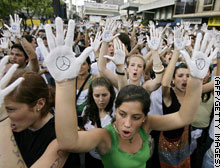
Story Highlights• Station banned by Hugo Chavez posts content on Web site• RCTV's affiliate in Colombia beams newscast into Venezuela • Closing of station prompted large street protests Adjust font size:
CARACAS, Venezuela (CNN) -- Radio Caracas Television, the station silenced by Venezuelan President Hugo Chavez, has found a way to continue its daily broadcasts -- on YouTube, the popular video Web site. Although the station is officially off the air, CNN's Harris Whitbeck said its news department continues to operate on reduced staffing, and the three daily hour-long installments of the newscast "El Observador" are uploaded onto YouTube by RCTV's Web department. In addition, RCTV's Colombia-based affiliate, Caracol, has agreed to transmit the evening installment of "El Observador" over its international signal. The program, which will run at midnight, could reach about 800,000 people in Venezuela. Although this is drastically reduced from RCTV's previous audience, its continued presence is a sign of hope for the staff. "We're just doing our job as journalists," said an employee of RCTV. "As long as somebody is seeing us, we consider what we are doing to be valid." Thousands of people, most of them from area universities, took to the streets of Caracas in protest this week after Chavez refused to renew RCTV's broadcasting license, which expired last Sunday. (I-Report: Watch marchers fill street to protest station's closing Chavez accused RCTV of violating broadcast laws and supporting a botched coup against him in 2002. He replaced RCTV on Monday with a state-run broadcast station . RCTV, which had been on air for 53 years, aired soap operas, programs and news broadcasts with a decidedly anti-governmental perspective. It was one of only a handful of private broadcast stations in Venezuela that openly criticized the government. Another, Globovision, has received similar threats from Chavez regarding its right to broadcast. One of YouTube's many features is the option for viewers to comment on the posted videos, and recently old and new segments of RCTV programming on the site have been accompanied by fiery debate about the limits of free expression. "Cerrar un medio de comunicacion es una monstruosidad sin excusa alguna," stated one commenter: "To close a means of communication is an inexcusable monstrosity."  University students rally for a fourth day Wednesday against Venezuelan President Hugo Chavez's decision to close an opposition TV station. Browse/Search
VIDEO
RELATED |